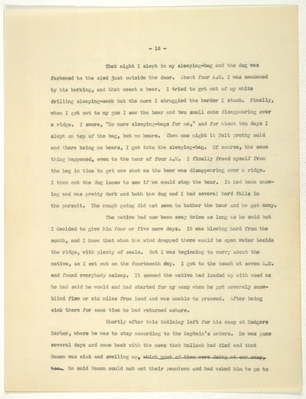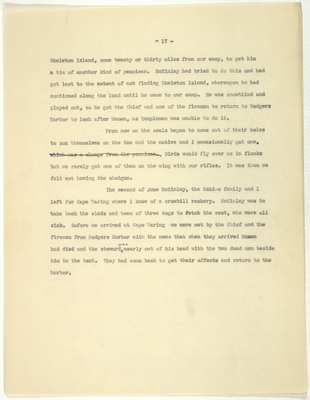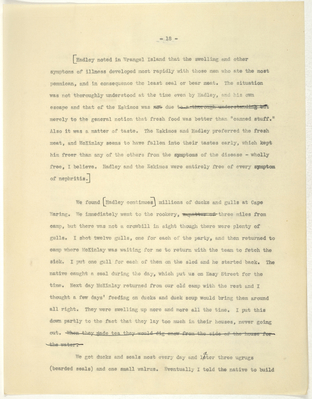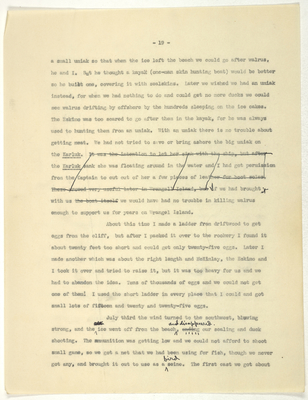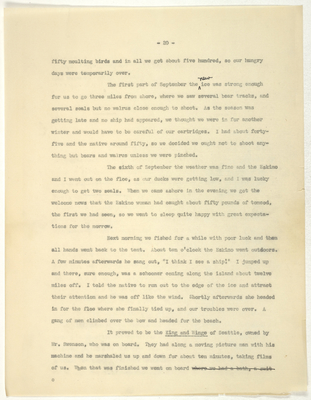Pages
stefansson-wrangel-09-25-004-016
- 16 -
That night I slept in my sleeping-bag and the dog was fastened to the sled just outside the door. About four A.M. I was awakened by his barking, and that meant a bear. I tried to get out of my white drilling sleeping-sack but the more I stuggled the harder I stuck. Finally, when I got out to my gun I saw the bear and two small cubs disappearing over a ridge. I swore, "No more sleeping-bags for me," and for about ten days I slept on top of the bag, but no bears. Then one night it felt pretty cold and there being no bears, I got into the sleeping-bag. Of Course, the same thing happened, even to the hour of four A.M. I finally freed myself from the bag in time to get one shot as the bear was disappearing over a ridge. I then cut the dog loose to see if we could stop the bear. It had been snowing and was pretty dark and both the dog and I had several hard falls in the pursuit. The rough going did not seem to bother the bear and he got away.
The native had now been away twice as long as he said but I decided to give him four or five more days. It was blowing hard from the south, and I knew that when the wind dropped there would be open water beside the ridge, with plenty of seals. But I was beginning to worry about the native, so I set out on the fourteenth say. I got to the beach at seven A.M. and found everybody asleep. It seemed the native had loaded up with wood as he had said he would and had started for my camp when he got severely snowblind five or six miles from land and was unable to procees. After being sick there for some time he had returned ashore.
Shortly after this McKinlay left for his camp at Rodgers Harbor, where he was to stay according to the Captain's orders. He was gone several days and came back with the news that Malloch had died and that Mamen was sick and swelling up. which most of them were doing at out camp, too. He said Mamen could not eat their pemmican and had asked him to go to
stefansson-wrangel-09-25-004-017
- 17 -
Skeleton Island, some twenty or thirty miles from our camp, to get him a tin of another kind of pemmican. McKinlay had tried to do this and had got lost to the extent of not finding Skeleton Island, whereupon he had continued along the land until he came to our camp. He was snowblind and played out, so he got the Chief and one of the firemen to return to Rodgers Harbor to look after Mamen, as Templeman was unable to do it.
From now on the seals began to come out of their holes to sun themselves on the ice and the native and I occasionally got one. which was a change from the pemmican. Birds would fly over us in flocks but we rarely got one of them on the wing with our rifles. It was then we felt not having the shotgun.
The second of June McKinlay, the Eskimo family and I left for Cape Waring where I knew of a crowbill rookery. McKinlay was to take back the sleds and team of three dogs to fetch the rest, who were all sick. Before we arrived at Cape Waring we were met by the Chief and the fireman from Rodgers Harbor with the news that when they arrived Mamen had died and the steward was nearly out of his head with the two dead men beside him in the tent. They had come back to get their effects and return to the harbor.
stefansson-wrangel-09-25-004-018
- 18 -
[Hadley noted in Wrangel Island that the swelling and other symptoms of illness developed most rapidly with those men who ate the most pemmican, and in consequence the least seal or bear meat. The situation was not thoroughly understood at the time even by Hadley, and his own escape and that of the Eskimos was not due to a thorough understanding but merely to the general notion that fresh food was better than "canned stuff.” Also it was a matter of taste. The Eskimos and Hadley preferred the fresh meat, and McKinlay seems to have fallen into their tastes early, which kept him freer than any of the others from the symptoms of the disease - wholly free, I believe. Hadley and the Eskimos were entirely free of every symptom of nephritis.]
We found [Hadley continues] millions of ducks and gulls at Cape Waring. We immediately went to the rookery, a matter of three miles from camp, but there was not a crowbill in sight though there were plenty of gulls. I shot twelve gulls, one for each of the party, and then returned to camp where McKinlay was waiting for me to return with the team to fetch the sick. I put one gull for each of them on the sled and he started back. The native caught a seal during the day, which put us on Easy Street for the time. Next day McKinlay returned from our old camp with the rest and I thought a few days' feeding on ducks and duck soup would bring them around all right. They were swelling up more and more all the time, I put this down partly to the fact that they lay too much in their houses, never going out. When they made tea they would dig snow from the side of the house for the water
We got ducks and seals most every day and later three ugrugs (bearded seals) and one small walrus. Eventually I told the native to build
stefansson-wrangel-09-25-004-019
- 19 -
a small umiak so that when the ice left the beach we could go after walrus, he and I. But he thought a kayak (one-man skin hunting boat) would be better so he built one, covering it with sealskins. Later we wished we had an umiak instead, for when we had nothing to do and could get no more ducks we could see walrus drifting by offshore by the hundreds sleeping on the ice cakes. The Eskimo was too scared to go after them in the kayak, for he was always used to hunting them from an umiak. With an umiak there is no trouble about getting meat. We had not tried to save or bring ashore the big umiak on the Karluk. It was the intention to let her sink with the ship, but after the Karluk sank she was floating around in the water and I had got permission from the Captain to cut out of her a few pieces of leather for boot soles. These proved very useful later in Wrangell Island, but If we had brought it with us the boat itself we would have had no trouble in killing walrus enough to support us for years on Wrangel Island.
About this time I made a ladder from driftwood to get eggs from the cliff, but after I packed it over to the rookery I found it about twenty feet too short and could get only twenty-five eggs. Later I made another which was about the right length and McKinlay, the Eskimo and I took it over and tried to raise it, but it was too heavy for us and we had to abandon the idea. Tens of thousands of eggs and we could not get one of them! I used the short ladder in every place that I could and got small lots of fifteen and twenty and twenty-five eggs.
July third the wind turned to the southwest, blowing strong, and the [sle] ice went off from the beach and disappeared., ending our sealing and duck shooting. The ammunition was getting low and we could not afford to shoot small game, so we got a net that we had been using for fish, though we never got any, and brought it out to use as a bird seine. The first cast we got about
stefansson-wrangel-09-25-004-020
- 20 -
fifty moulting birds and in all we got about five hundred, so our hungry days were temporarily over.
The first part of September the new ice was strong enough for us to go three miles from shore, where we saw several bear tracks, and several seals but no walrus close enough to shoot. As the season was getting late and no ship had appeared, we thought we were in for another winter and would have to be careful of our cartridges. I had about fortyfive and the native around fifty, so we decided we ought not to shoot anything but bears and walrus unless we were pinched.
The sixth of September the weather was fine and the Eskimo and I went out on the floe, as our ducks were getting low, and I was lucky enough to get two seals. When we came ashore in the evening we got the welcome news that the Eskimo woman had caught about fifty pounds of tomcod, the first we had seen, so we went to sleep quite happy with great expectations for the morrow.
Next morning we fished for a while with poor luck and then all hands went back to the tent. About ten o' clock the Eskimo went outdoors. A few minutes afterwards he sang out, "I think I see a ship!" I jumped up and there, sure enough, was a schooner coming along the island about twelve miles off. I told the native to run out to the edge of the ice and attract their attention and he was off like the wind. Shortly afterwards she headed in for the floe where she finally tied up, and our troubles were over. A gang of men climbed over the bow and headed for the beach.
It proved to be the King and Winge of Seattle, owned by Mr. Swenson, who was on board. They had along a moving picture man with his machine and he marshaled us up and down for about ten minutes, taking films of us. When that was finished we went on board where we had a bath, a suit o
